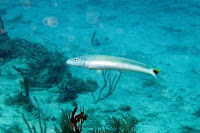Tilefish are members of the Branchiostegidae and Malacanthidae families, which include roughly 50 species that are distributed worldwide.
Most tilefish are less than 2 feet extended and thin. The anal and the dorsal fins are long and low; the pelvic fins are located far forward, directly under the pectorals. Some exist in temperate waters, but most are tropical.
A well-known species is the great northern tilefish (Lopholatilus chamaeleonticeps), which inhabits the outer continental shelf from Nova Scotia to northern South America and is moderately inexhaustible from southern New England to the mid-Atlantic coast at depths of 44 to 240 fathoms.
A well-known species is the great northern tilefish (Lopholatilus chamaeleonticeps), which inhabits the outer continental shelf from Nova Scotia to northern South America and is moderately inexhaustible from southern New England to the mid-Atlantic coast at depths of 44 to 240 fathoms.
Relatively Slow Growing
 Tilefish is relatively slow growing and long lived, with a maximum age and length of 35 years and 43 inches in females, and 26 years and 44 inches in males. Both sexes are mature at ages 5 to 7. The back and the sides are bluishor greenish-gray, sprinkled with yellow spots.
Tilefish is relatively slow growing and long lived, with a maximum age and length of 35 years and 43 inches in females, and 26 years and 44 inches in males. Both sexes are mature at ages 5 to 7. The back and the sides are bluishor greenish-gray, sprinkled with yellow spots. The belly and the cheeks are rose, grading into white at the midline. The dorsal fin is marked with yellow spots. The pectoral fins are dark and margined with black, as is the anal fin.


No comments:
Post a Comment